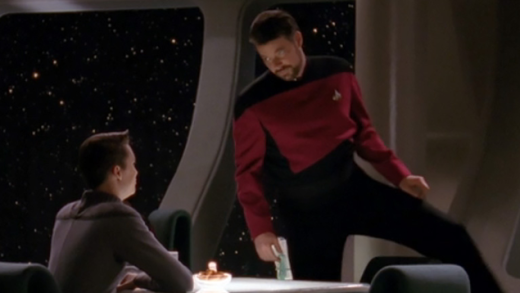Those who loved La La Land are about to get Whiplash from Damien Chazelle’s latest.
Where that winsome musical sang and danced (and monologued) about the hopes and wonders of Hollywood, Babylon assaults audiences with gross-out gags and tiresome debauchery, painting the movie-making industry as a hedonistic hellscape of unhinged egos, forgotten tragedies, and devious star power. It’s the kind of finger-wagging perspective one might expect from a conservative politician or a fire-and-brimstone preacher. So, it’s downright confounding that such showbiz cynicism comes from Chazelle, a critically heralded, Oscar-winning filmmaker who’s been a Variety cover boy.
Brace yourself for Chazelle’s about-face, because Babylon is a ghastly, sticky, indulgent mess of a movie, slinging shock value in lieu of anything interesting to say.
What’s Babylon about?

Credit: Paramount Pictures
Written and directed by Chazelle, Babylon cruises through a chaotic community of stars, hangers-on, and wannabes, all clamoring for relevance in Hollywood’s silent film era. Familiar archetypes parade around in glamorous costumes, slinging sharp barbs and reckless moxie. Most are introduced in a raucous industry party in the film’s seedy first act.
With a smirk and a Clark Gable mustache, Brad Pitt swaggers onto the scene as oft-married (and even more oft-divorced) leading man Jack Conrad, who is as fueled by intoxicants as he is the desire to prove filmmaking is real art.
As aspiring starlet Nellie LaRoy, Margot Robbie gatecrashes in a stolen car and barely-there red dress, hurling herself into lowbrow banter and brazen exhibitionism that feels like a volatile mix of Judy Holliday and Mae West.
Elsewhere, Hacks‘ Jean Smart hovers as a snooping but stylish gossip reporter. But the showstopper of this decadent sequence is Li Jun Li as Lady Fay Zhu, who dons a sharp tuxedo and a sharper turn of phrase with a racy song, making her an intoxicating ode to Anna May Wong.
And yet none of these characters are Babylon‘s protagonist. Milling about all their glamor and garishness is Manny Torres (Diego Calva), a Mexican immigrant who dreams of working on a movie set. His guileless smile, ingenuity, and determination might be intended to set him apart from these rogues and rascals (who despite their vices are hard-working). But how innocent can Manny truly be if he sees all this depravity and dreams for nothing else?
Babylon is a gross-out comedy about the underbelly of Hollywood.

Credit: Paramount Pictures
“What kind of depravity?” you might well wonder. Well, the opening sequence ahead of the party introduces Manny as a problem-solver tasked with transporting an elephant up a mountain. It’s a decent metaphor on its own for the Sisyphean nature of Hollywood, where every production can feel like no traction has been gained since the last. But Chazelle pushes this punishing metaphor a step further and grosser by having the elephant shit all over the poor fools pushing it. Not only that, he shows us the elephant’s asshole in close-up as it lets loose with a spray of liquid feces as if this were a challenge on Double Dare. And that is just the start.
Want more about the latest in entertainment? Sign up for Mashable’s Top Stories newsletter today.
At the party, other bodily fluids fly. A giddy flapper purposefully pisses all over a naked man, who claps in excitement. A small man in a diaper wiggles a towering plastic penis so it sprays revelers with white goo. Then, much later, Robbie’s sex kitten will projectile vomit on a historical figure as if he were a priest in The Exorcist.
This muck is flung with comedic abandon by Chazelle, but the effect — while shocking to see in a star-studded studio movie hitting in the heart of awards season — is joltingly joyless. Those debased are unnamed nobodies or banally infamous, making the emotional impact shallow, though your stomach may turn. Perhaps it’s all meant as a metaphor for the gross games played behind the scenes of red-carpet glamor. But that argument is dulled by the production, which revels in high-saturated hues, lush costumes, and even a string of dazzling much-adored performers. When it’s not disgusting, Babylon is a gorgeous film slicked in star power. It’s as if even as he aims to indict Hollywood for its excess, Chazelle can’t resist employing its temptations.
Chazelle might aim to shock and dazzle with anecdotes about betrayals, bruised egos, manipulation, drugs, gambling, and murder, but his flurry of fucked-up stories will feel tiresomely familiar. Characters that might seem dangerous in a drama — a volatile drug lord, an ornery army of unruly extras, a surly hitman — are all softened with a theatrical delivery and bouncy banter that feels plucked from a Coen brothers’ comedy. Other allusions to famous Hollywood films abound, but the most egregious offense is how Babylon rips off Singin’ in The Rain. Not only does Chazelle snatch several plot points, jokes, and sequences from the Gene Kelly classic, but then he shows that film within his film, suggesting it’s the Hollywood version of the gritty, REAL story he’s daring to unfurl, warts, piss, vomit, and all.
While this devil-may-care attitude might sound thrilling, it’s all done with a smug attitude that is exhausting early on, and only grows more so as the film progresses through a torturous runtime of three hours and 8 minutes. Even in a comedy packed with scatalogical humor, Chazelle takes himself achingly seriously.
Babylon fails its characters of color.

Credit: Paramount Pictures
Aside from Chazelle’s tedious damning of Hollywood’s decadence, he employs two undercooked subplots to half-heartedly jeer at the film industry’s long history of its sidelining of people of color. In one, Sidney Palmer, a Black trumpeter played by Jovan Adepo, rises to fame through a series of short films but faces crushing compromises as his fame grows.
In another, the witty and sultry Lady Fay Zhu contributes to the rise of the flashy new It Girl, Nellie, before they two tangle into a sapphic romance. (Chazelle leeringly lingers on their same-sex lip-lock as it this were a ’90s teen drama.) Yet despite Babylon‘s hours of runtime, Chazelle gives these threads too little time to develop. These intriguing characters vanish for such long stretches that you might forget they were ever there.
Sure, with so many threads and kooky characters, Chazelle can’t weave all of them into a rich tapestry. But when it comes to the white characters (who are also played by the biggest stars in the movie) he’ll revel in their screentime, repeating story beats of failed marriages and wallowing in physical comedy bits that go on painfully long. Then, he’ll bluntly intercut such manic comedy with scenes showing a character of color’s low point, as if their arcs are afterthoughts.
Adepo’s trumpeter is barely introduced before he’s plopped into heartbreak, while Li’s multi-talented Lady Fay Zhu is subjected to a lascivious gaze that treats her beauty and queerness as an exotic spectacle. Then, both are discarded before the final act. If Chazelle’s film is meant to condemn Hollywood and its sidelining Black, Asian and queer artists, maybe it should not do the same damn thing!
Brad Pitt, Margot Robbie, Tobey Maguire, and many more big stars line up to take the piss out of Hollywood in Babylon.

Credit: Paramount Pictures
Awash in warm gold hues that make champagne sparkle and flesh glisten, Babylon visually suggests that all that glitters is not gold. Chazelle’s screenplay ushers us through the backdoors of decadent parties, to their dance floors bursting with orgies, onto a tangle of outdoor sets, where sex, violence, and spectacle are valued above all else. His cast brings explosive energy to their crude characters, slinging four-letter words with mega-watt smiles and chucking themselves into pratfalls and puking with unblinking enthusiasm.
Pitt brings the swagger of his Inglourious Basterds persona to this insecure movie star, adding a dash of George Clooney-like clowning for good measure. Robbie repurposes the chaotic bisexual energy of Harley Quinn into a party girl doomed to score the spotlight. Tobey Maguire pops up in a ghoulish cameo, bringing a sensational level of mayhem in his unblinking stare and too-wide smile. And while they are comedically outrageous, Calva is left to play the put-upon straight man who grounds the story.
But the balance is off. Perhaps because Calva’s screen presence can’t stand up to his mega-star scene partners. Maybe because of how characters with less privilege (and thereby greater stakes) are sidelined as Manny moons over those with more (and lesser). Or perhaps it’s because amid all this mayhem and charisma, Babylon is ultimately shallow. Its condemnation of Hollywood feels furious but not profound. Its critique is full of outrage, but offers little argument.
Babylon feels like a tantrum. Purposefully repulsive and occasionally resplendent, Chazelle’s film grudgingly acknowledges the cinematic wonders of which Hollywood is capable, but then bellows about the chaos and carnage that lurks underneath those radiant marquees. It’s nothing new, really. A glossy veneer for his fitful critiques and sophomoric bile-spewing is created by Chazelle’s prestige, his cast’s star power, and the studio budget that allows for such lush production value. But as salacious or shocking as this movie may sound, these very virtues make its ire ring hollow, as its story aches for something daring to say. So, in the end, as wild as it sounds, Babylon is not madcap fun or deviously campy. It’s just plain boring.
Babylon is now in theaters.













